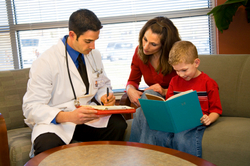
The number of American children leaving doctors’ offices with an attention deficit hyperactivity disorder (ADHD) diagnosis has risen 66 percent in 10 years, according to a new Northwestern Medicine® study. Over this same timeframe, specialists, instead of primary care physicians, have begun treating an increasing number of these young patients, the study found.
The study, which will be published in the March/April issue of the journal Academic Pediatrics, analyzed ADHD trends from 2000 to 2010 among children younger than 18 who were diagnosed and treated by office-based physicians. Researchers analyzed changes in the diagnosis of ADHD and treatment of the disorder over this 10-year time period.
“ADHD is now a common diagnosis among children and teens,” said Craig Garfield, MD, first author of the study. “The magnitude and speed of this shift in one decade is likely due to an increased awareness of ADHD, which may have caused more physicians to recognize symptoms and diagnose the disorder.”
Garfield is an assistant professor in pediatrics and medical social sciences at Northwestern University Feinberg School of Medicine and a pediatrician at Children’s Memorial Hospital and Northwestern Memorial Hospital.
Symptoms of ADHD, such as trouble paying attention and controlling impulsive behaviors and being overly active, can affect children and teens both academically and socially, Garfield said.
In the past decade several important regulatory and clinical changes regarding ADHD and the medications used to treat it have occurred, yet it was unknown how these factors have affected ADHD management, Garfield said.
For the study, Garfield and his team of researchers quantified ADHD diagnosis and treatment patterns among people younger than 18 using the IMS Health National Disease and Therapeutic Index. This is a nationally representative sample of office-based visits and included 4,300 office-based physicians in 2010.
According to the study, in 2010, 10.4 million children younger than 18 were diagnosed with ADHD at physician outpatient visits, versus 6.2 million in 2000.
Researchers also found that psychostimulants have remained the most common medication prescribed to children with ADHD. Psychostimulants were used in 96 percent of treatments in 2000 and 87 percent in 2010. The exact reason for the decrease is unclear, but there was not an increase in treatment with other, substitute medications, Garfield said.
While the majority of children and teens with ADHD are still managed by primary physicians, the study found that there has been a substantial shift away from primary doctors and toward specialists, such as pediatric psychiatrists.
“Recently, there’s been more public health advisories issued about problems or side effects of different ADHD medications,” Garfield said. “It may be that general pediatricians are shying away from treating patients themselves and instead rely on their specialist colleagues to provide the treatment and management of these medications.”
Given the short supply of psychiatrists specializing in pediatric ADHD, Garfield said this trend might make it difficult for many children to receive medical treatment of ADHD in the future.
This study was funded by the Agency for Healthcare Research and Quality and the Robert Wood Johnson Foundation.






